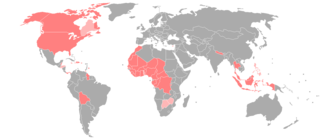Related Research Articles

Ruma is a town and municipality in the Srem District of the Autonomous Province of Vojvodina, Serbia. As of 2011, the town has a population of 30,076, while the municipality has a population of 54,339.
The Bete language of Nigeria is a nearly extinct language spoken by a small minority of the 3,000 inhabitants of Bete Town, Takum, Taraba State; its speakers have mostly shifted to Jukun Takum. It is close to Lufu.
The Kurama or T'kurmi or Akurmi language is a Kainji language of Nigeria. Kurama speakers are found in the central northern Nigerian states of Kaduna, Bauchi, Borno, Kano, Jigawa and Plateau.

There are over 525 native languages spoken in Nigeria. The Nigerian official language is English, the language of former colonial British Nigeria. As reported in 2003, Nigerian Pidgin was spoken as a second language by 60 million people in Nigeria.

Bata (Gbwata) is an Afro-Asiatic language spoken in Nigeria in Adamawa State in the Numan, Song, Fufore and Mubi LGAs, and in Cameroon in North Province along the border with Nigeria. Dialects are Demsa, Garoua, Jirai, Kobotachi, Malabu, Ndeewe, Ribaw, Wadi, and Zumu (Jimo). It is often considered the same language as Bacama.
Fali, or Fali of Mubi after the local city, is a Chadic dialect cluster spoken in Nigeria, in Adamawa State in the Mubi North and Michika LGAs. It is one of several languages in the area that go by the generic name Fali.
Bure, also known as Bubbure, is an Afro-Asiatic language belonging to the Bole-Tangale group of the West branch of the Chadic family. It is spoken in northern Nigeria in the village of Bure and in some small settlements nearby. The language is used mostly by a very few speakers, of great-grandparental generation. Except for Hausa, which is lingua franca in the area, Bure is surrounded by other Chadic languages such as Gera, Giiwo and Deno . Compared to other languages of the same group, the endangerment of Bure is by far the most critical.

Karai-Karai is a language spoken in West Africa, most prominently North eastern Nigeria. The number of speakers of Karai-Karai is estimated between 1,500,000 to 1,800,000 million, primarily spoken by the ethnic Karai-Karai people. It is an Afro-Asiatic language spoken principally in Nigeria with communities in Bauchi State, Yobe State, Gombe State and other parts of Nigeria. Many Karai-Karai words share a common origin with the Northwest Semitic languages of Hebrew and Arabic. Karai-Karai language is most closely related to the Ngamo and Bole languages which are both considered derivatives of the Karai-Karai language.
Abba Sayyadi Ruma was appointed Federal Minister of Agriculture and Water Resources in Nigeria by President Umaru Yar'Adua on 26 July 2007. He left office in March 2010 when acting president Goodluck Jonathan dissolved his cabinet.
Kwah (Kwa), also known as Baa (Bàː), is a Niger–Congo language of uncertain affiliation; the more it has been studied, the more divergent it appears. Joseph Greenberg counted it as one of the Bambukic languages of the Adamawa family. Boyd (1989) assigned it its own branch within Waja–Jen. Kleinewillinghöfer (1996) removed it from Waja–Jen as an independent branch of Adamawa. When Blench (2008) broke up Adamawa, Kwah became a provisional independent branch of his larger Savannas family.
The East Kainji languages are spoken in a compact area of the Jos Plateau in Nigeria, near Jos. There are more than 20 of them, most of which are poorly studied.
Jili (Lijili) is a Plateau language of Nigeria. It is one of several languages which go by the ambiguous name Koro.
Jukun (Njikun), or more precisely Jukun Takum, is a Jukunoid language of Cameroon used as a trade language in Nigeria. Though there are only a few thousand native speakers, and only a dozen in Nigeria, it is spoken as a second language in Nigeria by tens of thousands.
The Jijili language, Tanjijili, also known as Ujijili, is a Plateau language of Nigeria. It is one of several languages which go by the ethnic name Koro.
Yankam (Yangkam), or Bashar (Basherawa), is a moribund Plateau language of Nigeria. It is located to the west of Bashar town in Plateau State.
Bawm or Bawm Chin, also known as Banjogi, is a Kuki-Chin language primarily spoken in Bangladesh. It is also spoken in adjacent regions of Northeast India and Burma. The Bawms that live on the Chittagong Hill Tracts of Bangladesh call their settlements "Bawmram", which literally means an area or location inhabited by Bawms.
Lere is a nearly extinct Kainji dialect cluster of Nigeria. The ethnic population was cited as 16,000 in 2000, of whom only a few speak the language. A wordlist from the Takaya dialect can be found under External links.

American Sign Language (ASL) developed in the United States and Canada, but has spread around the world. Local varieties have developed in many countries, but there is little research on which should be considered dialects of ASL and which have diverged to the point of being distinct languages.
Laka of Lau is the only Central Sudanic language spoken in Nigeria. It is most closely related to Kabba Laka of Chad. The Hausa refer to the Laka people of Lau as Lakawa. The language was only recently documented in the mid-2010s, and had been previously misclassified as a Mbum language along with Lau.
Southern Kaduna is an area inhabited by various non-Hausa peoples living south of Zaria Emirate of Kaduna State. It is located in the Middle Belt region of Nigeria. Southern Kaduna consist of 12 local Government out of Kaduna State 23 Local Government. Some view it as being less of a geographical identity and more of an ethnic identity concept.
References
- ↑ Ruma at Ethnologue (18th ed., 2015) (subscription required)
- ↑ Blench, Roger (2019). An Atlas of Nigerian Languages (4th ed.). Cambridge: Kay Williamson Educational Foundation.